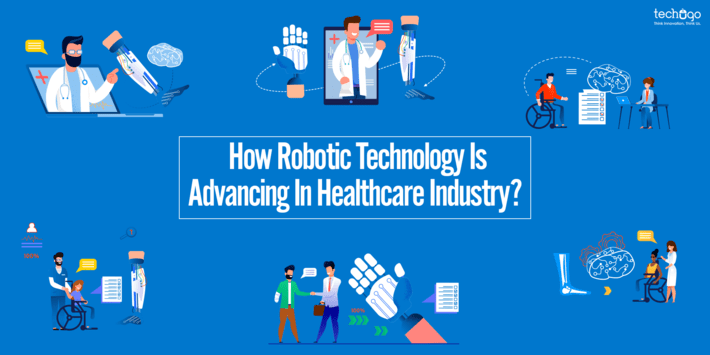
“Healthcare Industry has started to embrace the robotic technology which is paving the way for improved services. Let us learn more about it through this blog!”
The progression of various technologies has been changing the functioning of different sectors all over the world. This advancement is delivering excellence and elevating the user experience. From education to defense, and retail to entertainment, there is hardly any sector left unaffected by the charms of progressive technologies.
Just like other industries, healthcare has also been on its journey towards betterment. The impact can be seen in medicines, treatments, and digital tech that is helping the medical staff to improve the diagnosis and treatment of any disease. But the introduction of robots in this sector brings new hope.
Let us get deeper insights!
An Introduction To Robotics Technology
It is a seamless intersection of engineering, science, and technology, that leads to the creation of machines, commonly known as robots. Robotic technology is slowly becoming an absolute reality of our world. We can normally observe its role in the automobile industry, but now the development has expanded the impact. Now, they are everywhere from hospitals to malls changing the way we interact with technology.
The popularity of this trend is triggered by the era of advanced technologies. Robots are changing the face of medical institutions all over the world. They are bringing in a huge change in the field of medicine. Soon this tech would become part and parcel of our day to day routine.
How Robotics Will Change Healthcare?
Take a look at the list of ways in which robotics is changing the healthcare industry-
They reduce the load on the shoulders of the medical staff.
They provide the staff with extra time by taking up simpler responsibilities.
They reduce the complexity of different medical processes like examination, analysis, treatment, etc.
In operation theaters, robots ensure-
- Minimum blood loss
- Reduction in pain and discomfort
- Better recovery after the surgery
- Reduced chances of getting infected
- Lesser scars
That is not all-
- Robots play a huge role in decreasing the cost of medical treatment for patients.
- They help in the transportation of risky substances.
- They perform surgeries with perfection in a small space.
- They can guide patients at home.
Despite all these advantages, we cannot neglect the fact that the cost involved in its infrastructure is high. Also, there is a constant need for specialized training for people working with robots. But the good news is that AI technology with robotics is making way into the world, proving to everyone that their introduction is critical for the development of modern medicine.
Do We Really Need Robots In The Healthcare Industry?
- Since its implementation is neither easy nor cheap, businesses can often doubt its usefulness. So here is the list of their advantages that will further increase your interest.
- Many hospitals are using robots to clean and disinfect to avoid the involvement of human force in this task.
- Surgeons use remote-controlled robots to perform operations.
- With the help of rehabilitation robots, the recovery of disabilities of people is improving.
- This tech is very safe and involves less invasive surgeries.
- They act as vital medical assistants who can perform simple tasks like entering data or recording temperature with the ace.
- They are being used for medical transportation.
- Robots are necessary because they allow the medical staff to treat a patient in remote locations as well.
Robots In Healthcare
There are a couple of robots that provide medical staff with great help in assisting a patient. For example, they can become a companion of a paralyzed person and help them to walk again. Another example is a smart prosthesis, that has sensors that can make them accurate and reactive. They play a huge role in augmenting individual capabilities.
This technology doesn’t possess feelings, or the ability to get tired. Robots pay full attention at all times. Therefore, in a critical situation, they can be allowed to take the lead, where doctors can play a secondary role. But this can be done only when the software is programmed to perform correctly for a couple of undergoing the procedure.
Wrapping It Up!
The fact is that we live in a world of unmatchable opportunities. With the introduction of robotics in healthcare, we can find a way to coexist to ameliorate the capabilities of medical staff and the health of patients. The truth is, it has a lot in store, and with time we would be able to find a way to walk hand in hand.
As we are advancing towards the world of intelligent technologies, entrepreneurs have a great opportunity to jump on the bandwagon. If you want to fetch further insights into the digital transformation of the healthcare industry, then feel free to get in touch with us. You can leave your queries in the comment section present below.
For more buzz from the tech world, stay tuned to this space for more information.
Happy reading!
